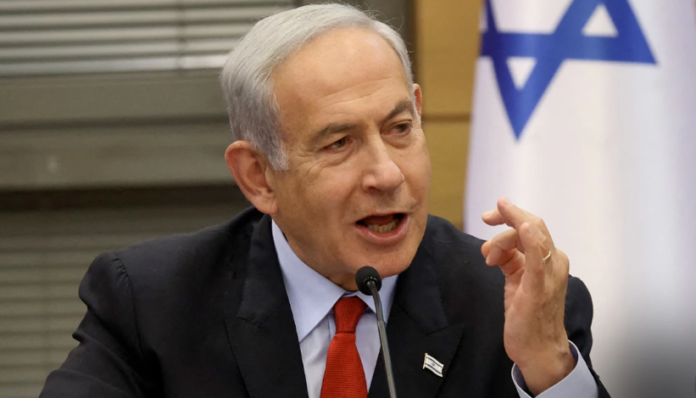Israeli Prime Minister Benjamin Netanyahu has reiterated his firm stance against the establishment of an independent Palestinian state. In a recent statement, he emphasized the need for full security control over the Palestinian territories, rejecting the position taken by United States President Joe Biden.
Netanyahu’s remarks came shortly after a phone call with President Biden, who has expressed unwavering support for Israel during its conflict with the Gaza Strip. Netanyahu’s opposition to a Palestinian state was clearly articulated in a post on X late on Saturday night.
He firmly stated, “I will not compromise on full Israeli security control over the entire area in the west of Jordan – and this is contrary to a Palestinian state.” This statement reflects his unwavering commitment to maintaining Israeli security interests in the region.
[ Israel’s Main Defence Arguments In The Genocide Case By South Africa At The ICJ ]
President Biden, in his conversation with Netanyahu, discussed potential solutions for the creation of an independent Palestinian state. He suggested the possibility of a non-militarized government as one path towards achieving this goal.
While Netanyahu’s position on the matter remains unchanged, Biden emphasized that a two-state solution is still a viable option, even with Netanyahu in office.
The phone call between President Biden and Prime Minister Netanyahu marked their first direct communication in nearly a month, according to the White House. The conversation highlighted the ongoing diplomatic efforts to address the Israeli-Palestinian conflict and find a path toward peace.
Netanyahu’s opposition to a Palestinian state is rooted in his belief that full Israeli security control is essential for the safety and well-being of his country. He views this control as a necessary measure to prevent potential threats and ensure the protection of Israeli citizens.
While President Biden’s perspective differs, both leaders are committed to finding a resolution that addresses the concerns of both Israelis and Palestinians. The Israeli-Palestinian conflict has long been a complex and deeply entrenched issue.
The question of Palestinian statehood has been a central point of contention in peace negotiations for decades. The international community has generally supported the idea of a two-state solution, which would involve the creation of an independent Palestinian state alongside Israel.
However, achieving this outcome has proven challenging due to various political, security, and territorial considerations. Prime Minister Netanyahu’s firm stance against a Palestinian state reflects the views of a significant portion of the Israeli population.
Many Israelis share their concerns about the potential security risks and have reservations about the viability of a two-state solution. They argue that previous attempts at peace agreements, such as the Oslo Accords in the 1990s, have not led to lasting stability and have instead resulted in violence and continued conflict.
While President Biden’s administration has expressed support for Israel, it has also emphasized the need for a fair and just resolution to the Israeli-Palestinian conflict.
The United States has historically played a significant role in facilitating peace negotiations and has sought to promote dialogue between the two parties. President Biden’s call with Netanyahu demonstrates his commitment to engaging with Israeli leadership and exploring potential avenues for progress.
Catch up with the latest news from The Times Post on WhatsApp by following our channel. Click here to join.


